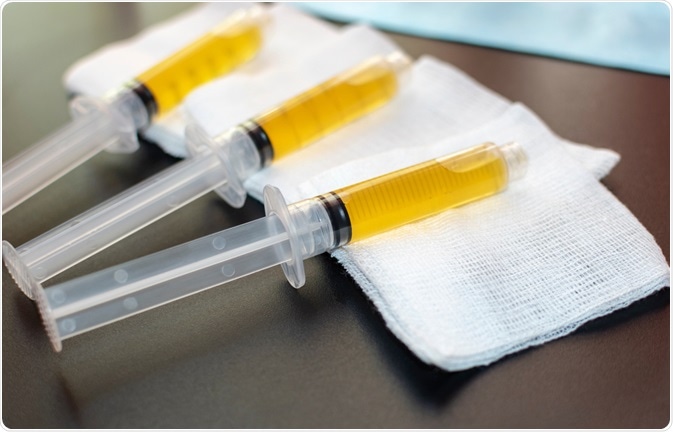Convalescent plasma is a way of artificially inducing passive immunity by transferring blood plasma from patients who have had a disease to naïve patients. This can then grant the recipient immunity towards the disease because of antibodies present in the blood plasma. Convalescent plasma therapy is one of the proposed treatments for COVID-19, although recent studies have debated its effectiveness.
 Image Credit: Elkhophoto/Shutterstock.com
Image Credit: Elkhophoto/Shutterstock.com
How does convalescent plasma therapy work?
The basic idea behind convalescent plasma therapy is that people who have had an illness and recovered from it have antibodies to it and are immune. Convalescent plasma is the blood from recovered patients, and in therapy, this is transferred intravenously to people who do not have antibodies to the disease and can, therefore, get immunity.
Several different types of convalescent plasma therapy can be considered. One of the commonly preferred ones is apheresis plasma. Here, larger volumes are collected each session, plasma donations are possible more regularly, and the donor’s hemoglobin does not need to be considered due to reinfusion of the red blood cells.
Studies on the effectiveness of convalescent plasma therapy, in general, are relatively few but show promising results. A systematic review of the use of convalescent plasma for the treatment of severe acute respiratory infections (SARI) viruses showed a 75% decrease in the risk of death of SARI patients compared to controls.
However, many of the studies included in this review had moderate or high risks of bias, which indicates more rigorous clinical trials are needed. This is partly supported by its relatively low success rate in improving survival from the Ebola virus.
While convalescent plasma has been broadly used for the past 100 years, some risks can be associated with it. These risks include allergic reactions, lung damage and difficult breathing, and transmission of infections such as HIV and hepatitis B.
However, the risks of this are low due to the strict regulation of plasma donations. Some other potential risks include the development of disease symptoms – this is rare but can result in severe complications.
Convalescent plasma and disease outbreaks
During times of epidemics or pandemics, when there are both many falling ill and many who are at risk, convalescent plasma therapy receives a lot of attention. This has been the case for epidemics of Ebola, Junin virus, and COVID-19, to name a few. Convalescent plasma is considered to have been effectively used in the treatment of SARS, MERS, and the 2009 H1N1 pandemic.
One of the more successfully documented examples of where convalescent plasma was used was during epidemics of the Junin virus. Patients treated with convalescent plasma had significantly reduced mortality rates, decreasing from 43% to 3%.
The selection of plasma donors can be difficult because the subjects and donors need to match. Similarly, during disease outbreaks, results can be more effective if a locally donated plasma is used on local subjects. This is because of the potential variation in pathogen strains between locations.
Convalescent plasma and COVID-19
Like other epidemics, convalescent plasma was considered for the treatment of COVID-19. It was hoped that convalescent plasma could help patients with severe COVID-19 better fight the virus, and therefore reduce the mortality of the virus.
Similarly, convalescent plasma could theoretically prevent progression to a more severe infection in patients with moderate COVID-19 complications. In many places, people who have contracted and recovered from COVID-19 are being encouraged to donate plasma for trials, treatment or stocks.
As of yet, there is not enough evidence to say whether convalescent plasma is a valid treatment for COVID-19. Initial results indicated that many who receive convalescent plasma benefit from this, but these results are not conclusive.
Many studies are suggesting that convalescent plasma does not have a significant beneficial effect in hospitalized COVID-19 patients. The RECOVERY trial was a large randomized trial carried out in the UK in 2020 in order to test potential COVID-19 treatments, including convalescent plasma therapy. In January 2021, the RECOVERY trial stated that they had found no significant mortality benefit for hospitalized patients treated with plasma. Results have not yet been published, and data is still being analyzed for subgroups.
However, there is some indication that convalescent plasma can be used successfully earlier on, before hospitalization, to stop the virus, but cannot do much later on when the damage has already been done that antibodies cannot repair. International trials are currently testing this theory and there is some preliminary evidence supporting it.
How you can help patients battling COVID-19 by donating convalescent plasma
References
- Duan, K., Liu, B., Li, C., Zhang, H., Yu, T., Qu, J., Zhou, M., Chen, L., Meng, S., Hu, Y., Peng, C., Yuan, M., Huang, J., Wang, Z., Yu, J., Gao, X., Wang, D., Yu, X., Li, L., Zhang, J., Wu, X., Li, B., Xu, Y., Chen, W., Peng, Y., Hu, Y., Lin, L., Liu, X., Huang, S., Zhou, Z., Zhang, L., Wang, Y., Zhang, Z., Deng, K., Xia, Z., Gong, Q., Zhang, W., Zheng, X., Liu, Y., Yang, H., Zhou, D., Yu, D., Hou, J., Shi, Z., Chen, S., Chen, Z., Zhang, X. and Yang, X., 2020. Effectiveness of convalescent plasma therapy in severe COVID-19 patients. Proceedings of the National Academy of Sciences, 117(17), pp.9490-9496.
- Marano, G., Vaglio, S., Pupella, S., Facco, G., Catalano, L., Liumbruno, G. and Grazzini, G., 2016. Convalescent plasma: new evidence for an old therapeutic tool? Blood Transfusion, 14(2), pp.152-157.
- Mayoclinic.org. 2020. Convalescent Plasma Therapy. [online] Available at: <https://www.mayoclinic.org/tests-procedures/convalescent-plasma-therapy/about/pac-20486440>.
- Nhsbt.uk. 2021. Convalescent plasma donations for COVID-19 restarting. [online] Available at: https://www.nhsbt.nhs.uk/news/convalescent-plasma-donations-for-covid-19-restarting/
- Recoverytrial.net. 2021. RECOVERY trial closes recruitment to convalescent plasma treatment for patients hospitalised with COVID-19. [online] Available at: https://www.recoverytrial.net/news/statement-from-the-recovery-trial-chief-investigators-15-january-2021-recovery-trial-closes-recruitment-to-convalescent-plasma-treatment-for-patients-hospitalised-with-covid-19
- Wise, J. (2021). Covid-19: Convalescent plasma may cut deaths in patients not on ventilation, study indicates. BMJ, 272:n130.
Further Reading
Last Updated: Apr 14, 2021